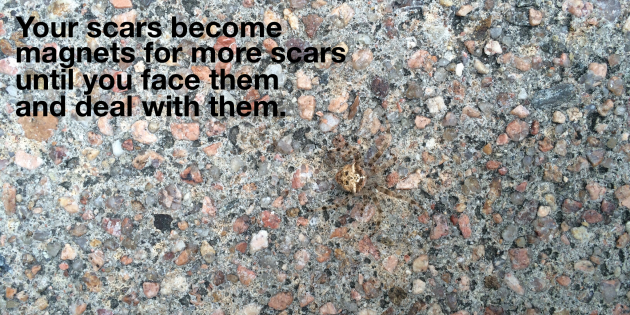Maureen writes “I’ve really lost interest in your work since you said on your webinar that if you get cheated on it’s your fault.”
Hmmm. Let’s rewind that part of the webinar and I think you’ll see how you heard it through your filters as “fault” when I actually was talking about responsibility.
There is a big, and often mistaken, difference between “fault” and responsibility.
The victim hears, because of the victim’s perceptions, blame. The victim hears other’s telling him or her “it’s your fault.”
If my wife cheated on me, the first place I’d look is in the mirror. But I would not be looking at how is this my fault (again victim language), but instead, “how could I have contributed to this?” or “what is my part in this mess?” (responsibility).
By uncovering potential ways I contributed, I gain more and more choice in the matter which is empowering. When I begin to take responsibility for ways I’ve contributed to her cheating on me, I open up new possibilities for myself around what I could have done differently and I can apply that lesson moving forward.
If I see this as my “fault” (or her “fault” for that matter) I remain a helpless victim of my circumstances rather than a mature adult who can, and will, get in the driver’s seat of his or her empowerment.
When I take responsibility I can see how I made choices that may have contributed to my partner’s behavior that I feel hurt by. I may have been not appreciating her. I may have been too shut down to meet her needs. I may have driven her away by my neediness. Whatever the case may be, I’m going to get to the bottom of my part, so I can learn and grow from the experience so that I don’t repeat this painful experience.
So long as I put the responsibility on someone else, I’m helpless to do anything about it and I don’t have to change anything about me. This stance of course, works for the victim because the victim wants a rescuer, a savior. This is low hanging fruit for the victim.
The victim wants a pill to take the pain away as opposed to real solutions to face the pain directly. The victim will then go to a therapist or friend to get confirmation that they are indeed a powerless victim who can’t change anything and they often surround themselves with “helpers” who keep them stuck right where they are by colluding with their side of the story. Victims want support without challenge and prefer the stance of disempowerment which is why they are so hard to help.
And make no mistake I have a victim living inside of me who, at times, would prefer someone save me from my pain, so that I don’t have to face it or feel it. So, I get it. And, for nearly two decades of my life I remained a very entitled victim who didn’t want to do the work to get empowered. I sought out a lifestyle where I relied and depended upon external validation to feel okay about myself. My “pills” were drugs, alcohol, validation from others, and the mountains. I wasn’t willing to correct my shit on the inside. I would leave people before I drove them away. I blamed every woman I date for how I was feeling. It’s her, not me. I was the classic victim and I had the hallmark sign of a victim–denial that I’m a victim.
So, mark my words, your scars become magnets for more scars until you face them and deal with them. The victim blames and wants rescuing with this. The warrior owns their part, deals, heals, and moves forward to face the next challenge.
Related Podcast Episode





3 Comments
Carrie
August 28, 2016I think it’s better for me to simply state, yes I had responsibility to problems in my marriage but I had no part in cheating bc I wasn’t given a vote in that.
I am not a victim either. I have choices too.
To reduce affairs to “I may have been not appreciating her. I may have been too shut down to meet her needs. I may have driven her away by my neediness” is truly unfair to a betrayed spouse.
My husband was a pornograohy addict (I had no idea bc he hid it completely from me) and had several affairs. Trust me when I tell you that there is no way my “neediness” or “lack of appreciation” lead him to these affairs. Even he will tell you that.
Kalvinder
December 11, 2016I agree with you that he was responsible for his choices as you are for yours. And I agree that people often hear this as blame but it is about each of us being repsonsible for our own actions and words and not blaming the other person because someone said something or did something you did not like. It still is the other person’s responsibility if they hit you or cheat on you or they could speak to you like a grown up and have a discussion. Men and women are bad at this so it is not a gender thing but each person has their own issues.
Shelley
February 16, 2017I am going through this now. I just found out because I felt something wasn’t right to use my instincts and figure it out.
My husband of 12 years met a hooker 2.5 years ago while I was in another state with my mom for three months while she was dying. Before I left to be with her, I broke my leg badly and was in a wheelchair for a year, three months of that time I was with my mom.
I don’t know at the time how I could have changed things, but he told me I abandoned him and he was lonely. BS!he has been acting weird since Xmas and his hooker friend came to my door and she told me he was on meth and who she was….my world is crumbling around me right now and I am a mess! I found this out on Valentines Day, and have packed his stuff, changed the locks and reeling inside.
How was I to change this scenario after being in hospital for 2 weeks, a rehab for 8 weeks and the within 1 month to be with my dying mom? Please tell me, because I can’t figure it out!
I
Leave A Response